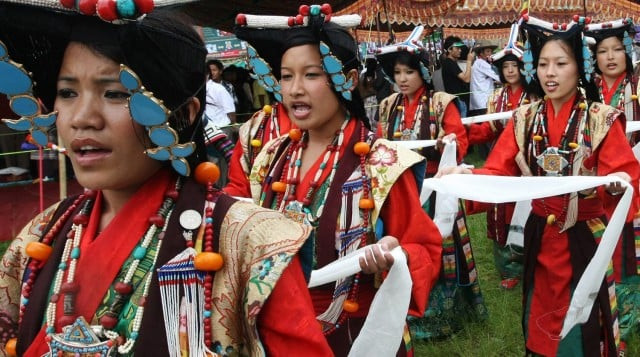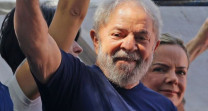Celebrations as Dalai Lama turns 75
The Dalai Lama turned 75 on Tuesday, a milestone marked by celebrations in his hometown-in-exile.

Under relentless rain, the Tibetan spiritual leader addressed a packed crowd of 5,000 followers at his temple in McLeod Ganj, a hill station in the Indian Himalayas where he has lived since fleeing Tibet in 1959. Smiling and in apparently fine health, the Buddhist spiritual leader sat at the centre of a stage in front of thousands of school children, fellow Tibetans in exile and foreign tourists.
Staring out at a banner depicting him at various stages over the last three-quarters of a century, he declared: “When I see those pictures and see the development, I know my life has not been wasted.”
In a speech delivered in his native language, he regretted that Tibetans in Tibet would not be allowed to mark his birthday due to oppression from the Chinese authorities, which vilify him as a separatist.
Stressing that studying Buddhism enabled him to be happy in adversity, he urged the crowd to show compassion in their own lives and finished with some practical advice. “Be careful of the weather. Don’t get ill,” he said, as many shivered in the downpour.
At an age when most others are putting their feet up, the Dalai Lama keeps up a globe-trotting schedule that would tire someone half his age, travelling to countries willing to defy Chinese pressure not to grant him a visa.
In an average year, he is away from home for about half the time and in the past 12 months has visited France, Switzerland, the Czech Republic, Germany, Poland, the United States (twice), Taiwan and most recently Japan.
As the years go by, however, thoughts are inevitably turning to the issue of succession.
The Dalai Lama has been in hospital twice in recent times - for a pinched nerve in February last year and for surgery to remove stones from his gall bladder in October 2008.
While decades of on-off negotiations with Beijing have seen no tangible progress, the Nobel peace laureate has been extremely successful in keeping the Tibet issue alive with a campaign that continues to attract global sympathy.
There is concern, however, that his death might prove a blow to the cohesion and momentum of the Tibetan movement that has relied for so long on his leadership and the reverence in which he is held by sympathisers. “It will be a completely different ball game when His Holiness is no longer with us,” the president of the Tibetan Youth Congress, Tsewang Rigzin, told AFP.
“We need to be prepared for that day when it comes and that means having a strong government in exile and a good education system for the young generation.”
The prime minister of the government-in-exile, Samdhong Rinpoche, urged the Dalai Lama to slow down to preserve his energy as his endeavours “are certainly taking a great toll”.
“We would like to implore him to kindly see to it that his daily programmes do not come in the way of his good health,” he added.
Published in The Express Tribune, July 7th, 2010.



















COMMENTS
Comments are moderated and generally will be posted if they are on-topic and not abusive.
For more information, please see our Comments FAQ